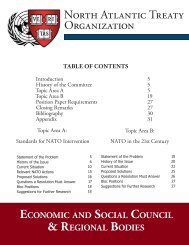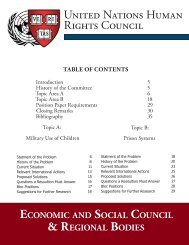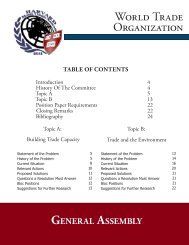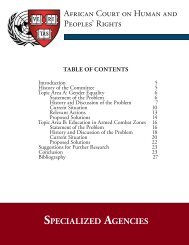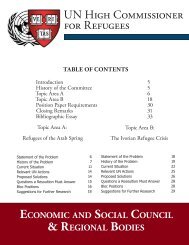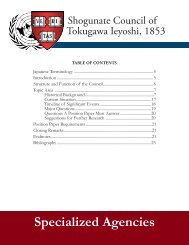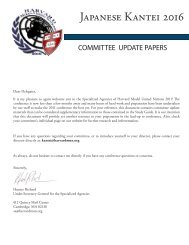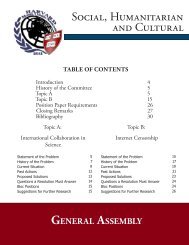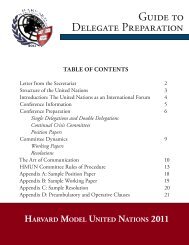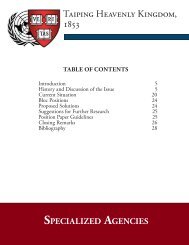Press Corps - Harvard Model United Nations
Press Corps - Harvard Model United Nations
Press Corps - Harvard Model United Nations
You also want an ePaper? Increase the reach of your titles
YUMPU automatically turns print PDFs into web optimized ePapers that Google loves.
JCC: Supreme Defense Council of the Islamic<br />
Republic of Iran, 1980<br />
JCC: Iraqi Revolutionary Command Council, 1980<br />
Committee Procedures<br />
For obvious reasons, <strong>Press</strong> <strong>Corps</strong> will not operate<br />
like any of the other committees at HMUN. Though<br />
the press room will serve as our committee’s headquarters,<br />
reporters can expect to spend most of the conference visiting<br />
committee rooms, conducting interviews throughout the<br />
hotel, and writing stories. This section will explain how this<br />
unique committee will be run during the conference.<br />
Represented News Agencies<br />
Just as delegates in committee take on the role of<br />
a particular nation, reporters will be representing a news<br />
agency for the duration of the conference. Unlike in most<br />
committees where a delegate is expected to express the policy<br />
of his nation, however, reporters should not feel obligated<br />
to report the news as their agency might like them to. That<br />
is to say, a reporter working for FOX News would not be<br />
expected to include conservative spin in his story, and a<br />
reporter working for The Times of India Group should not<br />
write stories only about India. Reporters are assigned to<br />
an agency to enrich the simulation—and they should do<br />
some background research on their assigned agency—but<br />
reporters should feel free to be independent journalists at the<br />
conference. News agencies represented at HMUN 2011 will<br />
be:<br />
Agence France-<strong>Press</strong>e<br />
Al-Jazeera<br />
Baltic News Service<br />
BBC News<br />
Bloomberg L.P.<br />
BNO News<br />
Canadian Broadcasting Corporation<br />
CNN<br />
Deutsche <strong>Press</strong>e-Agentur<br />
El Pais<br />
Folha de S. Paulo<br />
Komsomolskaya Pravda<br />
Le Figaro<br />
Le Monde<br />
New York Times<br />
Reuters<br />
Sky News<br />
Straits Times<br />
The Daily Beast<br />
The Daily Nation<br />
The Huffington Post<br />
Innovation and Technology<br />
The Times of India Group<br />
Washington Post<br />
Xinhua News Agency<br />
Yomiuri Shimbun<br />
<strong>Press</strong> <strong>Corps</strong><br />
How Beats and Media Will Be Covered and Assigned<br />
At the beginning of every committee session,<br />
reporters will meet in the press room with the <strong>Press</strong> <strong>Corps</strong><br />
staff. When committee meets for the first time on Thursday<br />
evening, after brief introductions, staff will ask reporters<br />
for their preferences as to what types of content they are<br />
interested in producing over the course of the conference.<br />
Specifically, staff will ask if reporters are interested in<br />
(1) taking photographs or producing visual graphics, (2)<br />
writing for the blog, (3) producing video content, or (4)<br />
going to committees to produce news-based or opinion<br />
pieces. Generally, every reporter will spend most of the<br />
conference doing option (4), a fair bit of time doing option<br />
(3), and positions (1) and (2) will be rotated to accommodate<br />
as many reporters who wish to blog and take photographs/<br />
produce graphics as possible.<br />
Based on these preferences, reporters will be<br />
entered into a live algorithm that takes into account your<br />
preferences. Based on the outcomes of the lottery, for each<br />
committee session <strong>Press</strong> <strong>Corps</strong> staff will assign two or three<br />
reporters to be photographers and one or two reporters to<br />
be videographers who will go to different committee rooms<br />
taking pictures and video. Reporters should not hesitate to<br />
call or text a photographer or cameraman throughout the<br />
session to make sure that there is a photograph or video to<br />
go with their news pieces (see a note on cell phone usage<br />
in “Rules and Policies for Reporters”). For each committee<br />
session, staff will also designate two or three bloggers, who<br />
will write posts for The Unmoderated Caucus.<br />
The rest of the <strong>Press</strong> <strong>Corps</strong> will be assigned to a<br />
beat: General Assembly, Economic and Social Council &<br />
Regional Bodies, or Specialized Agencies. Beats will be<br />
rotated throughout the conference, so that every reporter<br />
can expect to cover each beat at least once. After these<br />
assignments are made, each beat will meet with a member<br />
of the <strong>Press</strong> <strong>Corps</strong> staff to devise a plan for which reporters<br />
are responsible for covering which specific committees.<br />
Reporters will then be released to cover their committees.<br />
By about an hour into each committee session, every reporter<br />
(except those assigned to be photographers, cameramen,<br />
and bloggers) should have come to the press room with<br />
an update about what type of content (s)he would like to<br />
produce. As described in the “Media and Content” section,<br />
there are three main options: (1) a short-form news piece, (2)<br />
an opinion piece, or (3) a video broadcast. The majority of<br />
content should fall into category (1), but at various points<br />
9




